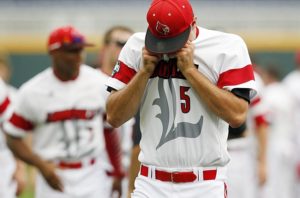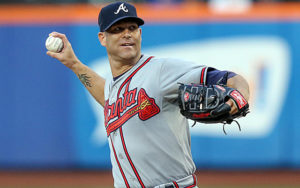The 90 and under crowd
The purpose of this isn’t to respond to questioners about softer tossing pitchers at the highest level of the game – although this would be a good place to refer them too. There are MANY more pitchers who had seasons where their average velocities were at or below the 90 mark. Some of you may be thinking, why does any of this matter, they didn’t throw these speeds when there were drafted or signed, so why should I care about how slow they throw if they didn’t initially. To this is my response, 1. You maybe shouldn’t care until / if the culture of the game changes how they scout and evaluate pitchers. For most, you’ll still need to throw hard to get opportunities in affiliated organizations, unless you have impeccable command at a slightly below average velocity and a rock solid success rate. 2. For some of these pitchers, their velocities were higher, for others they’ve shown to be consistent in nature through their careers, including when they were drafted or signed. The main point being, I don’t care about what they threw in the past or when they threw it. These are Major League pitchers, pitching in Major League baseball games, at these velocities over the course of a full season, or seasons. This isn’t a blog on draft velocities. This is a blog on Major League pitchers and their average velocities over the course of their respective season. These numbers play at the highest level of the game. So if these numbers play at the highest level of the game, success rate of pitchers who are DOMINATING at these speeds in amateur level should receive more stringent evaluations of their projection. To say, “they don’t throw hard enough”, is pure ignorance of the game with the ones currently, “not throwing hard enough” at the highest level. Sure the success rate of the pitchers on the list may vary, but the fact is, success is what matters at the highest level – and if the velocity is relevant (I.E. mid / upper 80’s) for an amateur pitcher who is EXTREMELY successful, more consideration should be taken into account, potentially allowing them to work toward their velocity goals within a system, while succeeding along the way. Their mentality has already proven to be a separator.
Are you a pitcher?
Another point of emphasis I’d like to convey, I’m not saying the highest level of the game should be flooded with these lower than average velocities. I’m saying the highest level of the game should have the best “pitchers” – and that velocity shouldn’t exclude pitchers who are dominant in nature at respective and relevant velocities. I’m not saying all Major League pitchers are bad, I’m saying if there were more “pitchers”, there would be a broader spectrum of success. All Major League pitchers are obviously there for a reason, due a variety of elements that has to do with talent and potential investments, but not all of them perform as well as they could, as consistently as they could. Pitching does still exists at high velocities, and I encourage that as well.
You aren’t “good” enough or “project” well enough to play at the next level.

The sad part is, as an example, when the culture pushes / asks a superior successful 85-87mph senior RHP in college who is getting no attention, and to abandon his stellar success rate, by getting out of his comfort zone trying to add more velocity just to get past the gate, then we have a problem… WHY? JUST WHY? Why when we have the same proven velocity at the highest level by some pretty outstanding pitchers. That isn’t a risk. There is no risk when you are signing a mentality that understands success rates and the importance of pitching, location, execution, and command. That pitcher will only get better, be smart enough to make adjustments, and continue to learn at a higher level by facing better hitters. This can be very frustrating for pitchers that are on a velocity cusp. In the end, these decisions all trickle down from the top and the direction of how organizations want to proceed with how they scout players. It’s not the scouting, scouts know what good pitching is and can project success, its what is wanted from the authority, the top. Many amateur and pro scouts go against gut instincts sometimes because of what the wants and needs are of organizations.
What would the game look like?
A lot of people have asked what baseball would look like if everyone pitched at a high rate of command and great success across all levels of the game. My response sounds something like, less injuries, close games, more consistently dominant performances, and hitters ironically needing to learn how to actually hit. We live in a time where have many preaching that MISTAKES are OK when you have more velocity (what’s more velocity? more is relative to every level of play. 95 mph mistakes still get hit at the highest level), while hitters train relentlessly to hit pitches that are MISTAKES. Here’s an idea, Lets be OK with mistakes even though hitters train to hit them… That is not an intelligent way to start a relationship with a pitcher as a pitching coach, and we have coaches conveying this to pitchers as a strategy. In my mind, that coach has instantly lost credibility. It’s not smart competing, its competing just to compete. Disregard of pitch execution is not intelligent pitching. Mistakes happen, pitching to be complacent with them because you “throw hard”, shouldn’t happen. Awareness, adjustments, and intent to make better pitches should be most mindful. What are some things that change if there are more actual pitchers? Hitters will need to learn how to actually hit quality pitches more consistently, which will be hard if a pitcher is executing patterns. The hitter will always be at a larger disadvantage when facing a higher degree of pitch quality (i.e. location) and execution within a pattern.
Enjoy the list and all comments are welcome. Some pretty great names below, and memorable careers.
2017 |
2016 |
2015 |
2014 |
2013 |
2012 |
2011-2000 |
| Bartolo Colon RHP 86.9 | Robbie Erlin LHP 89 | Bruce Chen LHP 85-86 | Jair Jurrjens RHP 89.5 | R.J. Swindle LHP 80-82 | Livan Hernandez RHP 85 | Dallas Braden LHP 87.6 (’11) |
| Richard Bleier LHP 88-89 | John Lannan LHP 86 | Randy Choate LHP 85 | Paul Maholm LHP 88 | Randy Wells RHP 88-89 | Jeff Karstens RHP 89.2 | Josh Spence LHP 84.9 (’11) |
| Josh Collmenter RHP 84.8 | John Lamb LHP 90 | Mark Buerhle LHP 84.06 | Pedro Hernandez LHP 87 | Ryan Dempster RHP 89.3 | Jamie Moyer LHP 79-80 | Josh Towers RHP 88 (’10) |
| Marco Estrada RHP 89.8 | Cody Ege LHP 87 | Justin Masterson RHP 88.2 | Cliff Lee LHP 89.7 | Zach Clark RHP 88-89 | Rodrigo Lopez RHP 88-89 | Jessie Carlson LHP 89.1 (’10) |
| Brad Ziegler RHP 84-85 | Steve Johnson RHP 90 | Samuel Deduno RHP 88.5 | Philip Humber 90.3 RHP | Carl Pavano RHP 86.5 | David Riske RHP 87 (’10) | |
| Josh Tomlin RHP 87.3 | Jake Peavy RHP 88.8 | Chris Young RHP 87.3 | Derek Lowe RHP 89 | Johan Santana 88.4 LHP | Jon Link RHP 90 (’10) | |
| Bronson Arroyo RHP 84-88 | Colby Lewis RHP 87.4 | Dan Haren RHP 87.3 | Roy Halladay 88-90 RHP | Trevor Hoffman RHP 86 (’10) | ||
| Mike Fiers RHP 89.6 | Joe Niese LHP 88.8 | Kyle Lobstein RHP 87.1 | Aaron cook 90 RHP | Josh Geer RHP 86 (’09) | ||
| Mike Leake RHP 89-90 | Henry Owens LHP 88.6 | Barry Zito LHP 84 | Andy Pettitte 89-90 LHP | Paul Byrd RHP 86 (’09) | ||
| Huston Street RHP 88 | C.J. Wilson LHP 90 | Brett Myers RHP 88-89 RHP | Chad Bradford RHP 80-81 (’09) | |||
| Brent Suter LHP 86.07 | Shaun Marcum RHP 85.1 | Jon Garland RHP 87.2 RHP | Brandon Webb 87-88 RHP (’09) | |||
| Joe Smith RHP 88-89 | Tim Hudson RHP 87.9 | Ted Lilly LHP 87.5 | Lenny Dinardo LHP 84 (’09) | |||
| Jaime Garcia RHP 89.8 | Jason Marquis RHP 86.8 | Steve Trachsel RHP 87 (’08) | ||||
| Jered Weaver RHP 83.4 | Steve Kline LHP 86 (’08) | |||||
| Kyle Hendricks RHP 86-87 | Greg Maddux RHP 85-87 (’08) | |||||
| Justin Vargas LHP 85.7 | Mike Mussina RHP 87 (’08) | |||||
| Tommy Milone LHP 87.9 | Kenny Rogers LHP 88 (’08) | |||||
| Koji Uehara RHP 87 | David Wells LHP 88 (’07) | |||||
| Sergio Romo RHP 86-87 | Mike Myers LHP 81 (’07) | |||||
| Doug Fister RHP 90 | John Halama LHP 86-88 (’06) | |||||
| Darren O’day RHP 88 | Mike Venafro LHP 85-86 (’06) | |||||
| Dallas Keuchel LHP 89-90 | ||||||
| Pat Venditte BOTH 88 | ||||||
| A.J. Griffin RHP 88 | ||||||
| Alex Claudio LHP 87 | ||||||
| Tommy Layne LHP 86-88 | ||||||
| Evan Scribner RHP 90 | ||||||
| Matt Cain RHP 89.3 | ||||||
| Hisashi Iwakuma RHP 85.6 | ||||||
| Collin Mchugh RHP 90 | ||||||
| Scott Feldman RHP 89.4 | ||||||
| Jeremy Hellickson RHP 90 | ||||||
| Zach Davies RHP 89.7 | ||||||
| Nick Vincent RHP 90 | ||||||
| Luke Gregorson RHP 89.5 |

